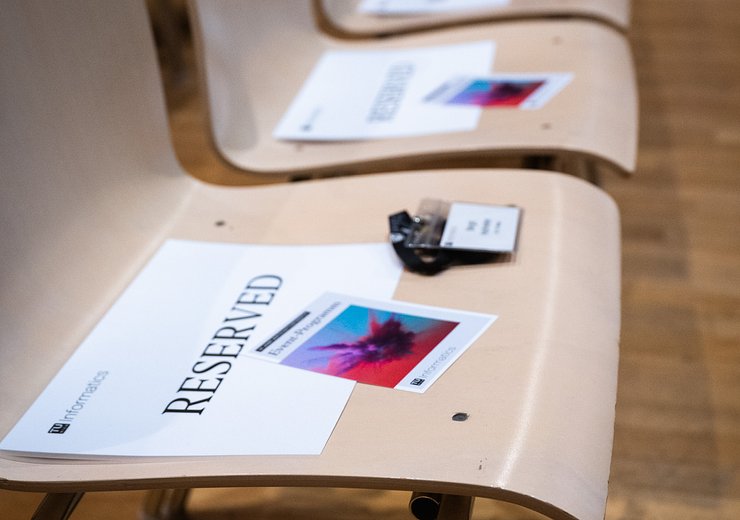Celebrating 50 Years of Business Informatics
Five decades of excellence: On November 17, TU Wien celebrated 50 years of Business Informatics with alumni, experts, and industry leaders.

Picture: Matthias Heisler / TU Wien
Over 50 years ago, the first Business Informatics study program in the German-speaking world was introduced by the University of Vienna and TU Wien. The combination of technological excellence and business acumen laid the foundation for a success story that has produced executives, successful startup founders, and university rectors. To celebrate this milestone, a special anniversary event was held at TU Wien on November 17, bringing together alumni, faculty, and industry experts for an evening of panels, talks, and discussions reflecting on the history, achievements, and future of Business Informatics.
The program offered attendees the opportunity to hear firsthand accounts from those who have helped shape the discipline, as well as insights from successful graduates and entrepreneurs applying their knowledge in Austria and beyond. The event began with a welcome address by Jens Schneider, Rector of TU Wien, and Gerti Kappel, Dean of the Faculty of Informatics, with Christian Huemer moderating the evening.
The Making of a Successful Discipline
The opening panel looked back at the early days of Business Informatics, bringing together A Min Tjoa, Hannes Werthner, and Hardy Hanappi, all emeriti professors of TU Wien who were instrumental in establishing the discipline. They reflected on the field’s defining characteristics—its interdisciplinarity, its ability to understand both growth and the limits of growth, and the responsibility to consider the societal consequences of the technologies we design, particularly in the context of the Global South. The discussion also highlighted the importance of Business Informatics in automating processes in industry and public administration, the need to stay in touch with societal developments, and milestones such as the introduction of the English-language master’s program and the creation of TU Wien’s innovation incubation center, the i²c.
The event then moved to a panel featuring successful alumni of Business Informatics: Stefanie Braschel (Head of Strategy at Hillroute Capital), Bernhard Hohenegger (Board Member at Bank99), Stefan Koch (Rector of Johannes Kepler University Linz), Andreas Tomek (Partner at KPMG Österreich), and Christian Weiss (Managing Director at Frequentis DFS Aerosense). Moderated by Lukas Bürstmayr (RISE), the panelists shared their experiences and insights on how the solid technological foundation from their Business Informatics studies shaped their successful careers in leadership and industry. All speakers emphasized the importance of a rigorous technical foundation, which provided them with the skills to work with complex systems and technologies, as well as the ability to self-organize, structure challenging tasks, understand underlying processes, and approach problems with critical thinking. The panel also highlighted the need to further strengthen alumni networks and the value of these connections throughout one’s professional journey.
The next panel, with Philipp Liegl (ecosio), Sander van der Rijdt (PlanRadar), Bernhard Schandl (9am.health), Lisa Smith (Prewave), and Simon Tragatschnig (fiskaly), turned to the realities of entrepreneurship. The speakers discussed Austria as a promising location for startups, noting that while Vienna is extremely livable, growing a business often requires looking beyond national borders. They reflected on how funding, seed capital, and the support ecosystem have significantly improved over the past two decades, while emphasizing that entrepreneurship remains demanding and not suited for everyone. Learning from failure, understanding customers and markets, and identifying real needs were highlighted as essential ingredients for turning strong technical ideas into successful companies.
Charting the Future of Business Informatics
Following these panels, Martin Bichler, Professor at the Technical University of Munich, held a keynote exploring the intersection of algorithms and market dynamics, a key area of his research. He discussed how many markets today run autonomously and explored whether they can be modeled and designed to remain efficient, fair, and stable. He emphasized that the intersection of business and informatics is key to this effort: by combining data, algorithms, and economic insight, we can better understand market dynamics and create systems that generate balanced value for both consumers and businesses.
The last discussion of the evening revolved around the future of Business Informatics, with a panelists Martin Bichler, Elmar Pichl (Ministry for Women, Science, and Research), Ernst Ellmer (former CEO of Zühlke Deutschland and Global COO of the Zühlke Group), and Ulrich Frank (Professor at University Duisburg-Essen). The speakers examined the overarching themes shaping the discipline today: the future of Business Informatics, its role in the digital economy, and the ongoing evolution of the field in both academic and industry contexts. The speakers noted that the field should continue to stand for both quality and breadth and highlighted the interdisciplinarity of the field as both an opportunity and a challenge that requires communication, exchange, and thoughtful moderation. The panel also discussed how AI will reshape economics and university teaching, but emphasized that students, even in the future, will still require a solid foundation in fundamental concepts to navigate these changes successfully.
The event concluded with a networking buffet, providing attendees with the opportunity to connect, discuss ideas, and establish relationships with fellow alumni, researchers, and industry professionals.
Curious about our other news? Subscribe to our news feed, calendar, or newsletter, or follow us on social media.































